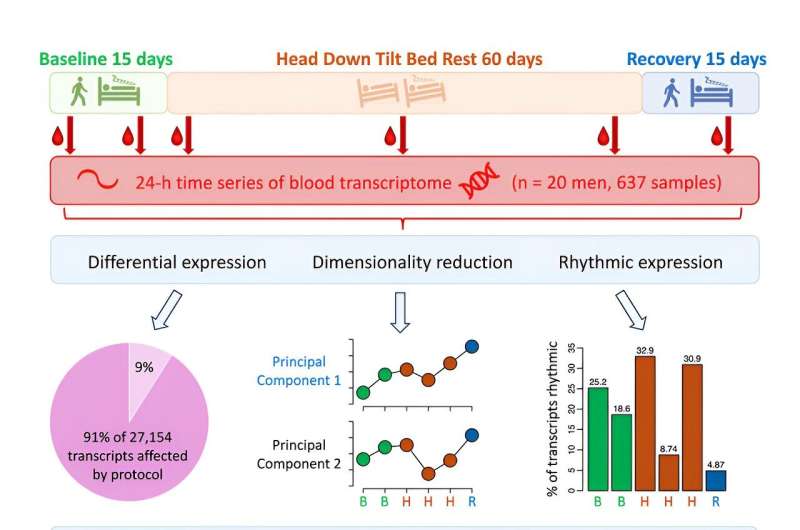"
In a study coordinated by the European Space Agency at the MEDES space clinic in Toulouse, 20 men completed a 90-day protocol consisting of two weeks of baseline before 60 days of constant bed rest at a -six-degree head-down tilt angle to simulate the effects of microgravity experienced by astronauts. The protocol concluded with two weeks of recovery.
The research team analyzed gene expression over a 24-hour time series during two days in baseline, three days in bed rest, and once in recovery. The results showed that 91% of gene expression was affected by the protocol, with major disruption to the number, timing, and amplitude of rhythmic genes, which display changes in their mRNA every 24 hours.
Disrupted gene expression is associated with protein translation, immune and inflammatory processes, and decreased muscle function. During the recovery period, disruption to muscle function was restored; however, lasting effects were identified with protein translation.
Senior author Professor Derk-Jan Dijk, Professor of Sleep and Physiology and Director of the Surrey Sleep Research Center, said, "Space travel was once thought to be unachievable; however, the growth of the space industry means it is now a real possibility. A lot remains unknown about the impact of microgravity on the body, and it is important we know more about this before we start 'holidaying' in space.
"Building on what we have found, the second part of our study, using the same cohort of men, will investigate the impact microgravity has on sleep, circadian rhythms and hormones of individuals."
Professor Keith Ryden, Professor of Space Engineering and Director of the Surrey Space Center, said, "Human spaceflight is very much on the agenda again with astronauts soon returning to the moon via NASA's Artemis project alongside the growth of space tourism. In addition, new plans are in place for a U.K. astronaut going to the ISS in 2025 via the UKSA Axiom program.
"It is great to see that with this new publication, the University of Surrey, well-known for its space research, is laying foundations for how to better manage the impact of the space environment on space travelers and ensure their safety."
More information: Simon N. Archer et al, Extensive dynamic changes in the human transcriptome and its circadian organization during prolonged bed rest, iScience (2024). DOI: 10.1016/j.isci.2024.109331
Journal information:iScience
Provided by University of Surrey



